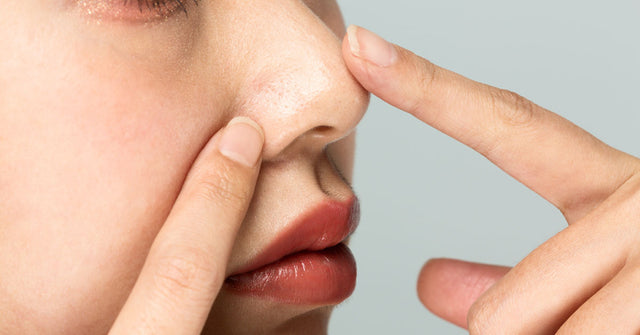For many, achieving silky, smooth skin is an important aim. While it's relatively easy to maintain a healthy complexion when you’re young, as you hit adulthood, the skin goes through transformations which may make it more difficult.
One problem that many people struggle with as they get older is textured skin. If you have dry, patchy areas, you might be wondering what to do about it. In this article, we’ll discuss the causes of this issue and give you some highly effective tips for eliminating textured skin.
What Is Textured Skin?
Textured skin is actually a broad term that can refer to various skin problems. The ideal skin texture is smooth and silky with a fresh, radiant glow. However, you may notice that areas of your skin feel rough, dry, or even oily. This can affect not only how your skin feels, but also alter your physical appearance.
It’s important to stress that the phrase “textured skin” doesn’t define one specific condition, instead, it’s a collective term to describe a complexion that is dehydrated, dry, oily, or uneven in tone. If you’re experiencing any of these problems, then you may want to consider some of the solutions for improving your skin texture we will present in this article.
Areas Commonly Affected By Textured Skin
Texture is an essential aspect of overall skin wellness, so it’s important to understand where this issue tends to occur. You can develop a textured appearance on any part of your body, and it may impact multiple areas at once.
In addition, you could experience different issues in different regions. For example, you may find that your face has an uneven texture, but you have dry patches of skin on your back.
Among the general population, textured skin is most likely to appear on areas that are often exposed to the sun, which includes the face, neck, chest, back, arms, and legs.
What Are The Causes Of Textured Skin?
We’ve explained that the term ‘textured skin’ has several meanings, which is why it’s important to look at each person individually to understand the root causes of the issue. If you want to know how to get smooth skin, you have to learn why your problems developed. These are some of the multiple reasons for changes in skin texture:
- Dehydration: It’s essential to drink water throughout the day to keep your body hydrated, and this has a number of health benefits. The advantages of hydration don’t just lie within but also extend to your skin [1]. If you are dehydrated blood flow can decline, contributing to a dry complexion.
- Inflammation: If you hurt yourself, inflammation helps with healing and even keeps germs out of the wound. However, if the inflammation becomes chronic it can cause health problems and change the texture of your skin.
- Free Radical Damage: Free radicals are unstable, harmful molecules that roam your body, causing oxidative stress and increasing your risk of inflammation and disease. The more free radicals in your body, the greater the harm. Free radicals can cause skin damage and may lead to textured skin.
- Poor Skincare: A daily skincare routine is essential when it comes to maintaining a healthy complexion, yet many people don’t follow one consistently. If this is the case for you, it may be one of the reasons for changes in the texture of your skin. Use quality, safe products that include pure bioactive ingredients.
- Using the Wrong Skincare: You may follow a regular skincare routine, but that doesn’t mean that you’re using the right products for your complexion. If your skin is oily and you use a formula that’s meant for dryness, for example, you may produce more oil due to the excess moisture. As using the wrong skincare could be one cause of textured skin, consider reassessing your routine.
- Waxing: One possible cause of textured skin that you may not have considered is waxing. Waxing may help remove unwanted body hair, but it can also cause damage to the skin. In any discussion of how to improve skin texture, it’s important to note that waxing can cause roughness over time.
Tips To Improve Skin Texture
We’ve taken a closer look at some of the reasons a textured skin complexion develops, as it's important to understand the root causes of the issue. These are some of the best lifestyle and skincare tips for improving your textured skin and overall complexion.
1. Apply Sun Protection
The sun helps your skin synthesize vitamin D, which is important for mood, cell growth, and supporting strong bones. However, overexposure to UV rays can cause harm to your skin, leading to sunburn, premature wrinkles, dryness, age spots, and roughness as well as putting you at risk for skin cancer.
It’s essential that you use sunscreen with at least 30 SPF daily, every time you go outside, to protect your skin from UV exposure. Make sure you apply it to your face and any other exposed areas and reapply every 2 hours if you are in the sun.
2. Use Retinol
Retinol is a popular and valuable ingredient included in many skincare products. It helps slow collagen breakdown [2] and enhance skin elasticity, as both collagen and elastin levels decline with age. Applying a product with retinol regularly can help reduce textured skin and make your complexion firm and smooth.
3. Exfoliate Regularly
Exfoliating is another way to maintain a healthy skin complexion and texture. When it comes to exfoliating your skin, it’s crucial to pick the right product. If you opt for a formula with harsh ingredients it can worsen existing issues, so take a close look at the ingredients list to ensure that the product is free of harmful chemical or artificial additives.
Exfoliating eliminates dead skin cells, dirt, and excess oil, unclogs the pores, and reduces acne. It also improves moisture absorption and enhances your skin’s overall appearance. Exfoliating daily is too hard on your skin, so aim for once or twice a week.
4. Cleanse Twice Daily
Your skincare routine should always begin with cleansing. In the morning, it helps to get rid of sweat and other particles that have collected on your skin through the night. Washing your face with a quality cleanser in the evening eliminates debris that has accumulated during the day. Follow up with a deeply purifying formula like Maxatone Clarifying Toner to get rid of any impurities your cleanser missed.
While it’s important to use a good cleanser to keep the skin on your face healthy, you should also use a high-quality product to clean the rest of your body. Take a closer look at your body wash to ensure that it’s appropriate for your skin type and texture. If you have dry skin, for example, make sure to use a product with deeply hydrating ingredients.
5. Detoxify and Repair Textured Skin
There’s a difference between detoxifying and exfoliating, and both are important. Detoxifying formulas reach deeper into your skin to eliminate free radicals, unclog your pores, and enhance your skin complexion generally.
It’s important to include antioxidant-rich formulas in your regimen that repair damage by lowering oxidative stress. Revivatone Intensive Neck and Chest Repair Complex is a targeted cream that strengthens the skin barrier, tightens, reduces age spots, and enhances tone and texture.
6. Follow A Balanced Diet And Exercise Regularly
Looking after your skin involves more than just using quality products, as your diet [3], exercise, and other health habits also play a key role. People who consume a lot of saturated fats and refined sugar are likely to develop dry skin, for example. For an optimal complexion, follow a nutrient-rich diet that includes plenty of fruits and vegetables, protein, and healthy fats.
7. Manage Your Stress Levels
High levels of stress can contribute to or worsen textured skin, which is one of the many reasons you should try to incorporate anxiety-reducing strategies into your life. This is especially important if you’re struggling with chronic stress, as it can increase inflammation and levels of the hormone cortisol. This could lead to collagen breakdown and premature aging, skin conditions like eczema, and other issues.
Frequently Asked Questions
What Vitamin Deficiency Causes Rough Skin?
There are several vitamins and minerals that your skin needs to stay healthy. For example, a deficiency in Vitamins A, D, iron, zinc, or niacin can contribute to a rough skin texture.
Why Is The Skin On My Body So Rough?
There are a couple of reasons you may develop rough skin on your body. In some cases, the cause is a skin condition that causes extreme dryness like xeroderma. In addition, products with harsh chemicals or additives and excess sun exposure may lead to rough skin.
At What Age Does Skin Texture Change?
Age is a major risk factor in the development of textured skin, although there are other issues to consider. While your skin goes through many changes as you age, you’ll usually see the most significant transformations starting in your 40s [4].
Conclusion
While textured skin is usually not a cause for huge concern, it does make some people feel self-conscious. Many of us strive to maintain smooth skin, and when dry patches, large pores, or uneven texture develop, it becomes more difficult. This article helps you to understand the causes of your textured skin, and the tips we provide offer solid skincare and lifestyle solutions.
References
1] ↑ https://pubmed.ncbi.nlm.nih.gov/29703638
2] ↑ https://my.clevelandclinic.org/health/treatments/23293-retinol
3] ↑ https://www.webmd.com/skin-problems-and-treatments/acne/features/diet-and-skin
4] ↑ https://www.realsimple.com/beauty-fashion/skincare/anti-aging/aging-skin-concerns










